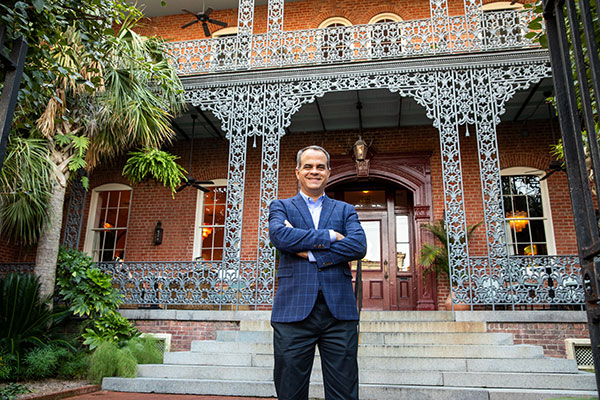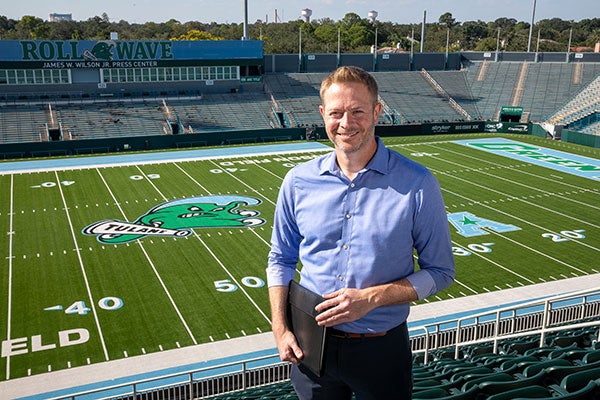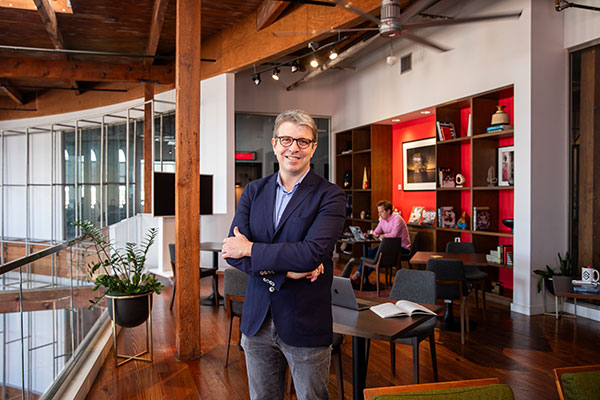
The new Undergraduate Certificates Program gives students the option of specializing in one of four high-demand industries, putting them on track for career success.
AS AN INVESTMENT ANALYST at Welltower Inc., a Fortune 500 real estate investment trust, David Renbaum (BSM ’23) specializes in commercial underwriting, evaluating the risk associated with acquisitions for the firm, one of the nation’s largest owners of senior housing and medical office buildings. “There’s a common-sense component to real estate that really agrees with the way my brain works,” Renbaum says. “At the end of the day, it’s got to be a great asset, it’s got to be great land, and it’s got to be a great market. These are very basic things.”
Renbaum credits the Freeman School with introducing him to real estate, and specifically A.J. Brooks, lecturer in finance, whose course Real Estate Valuation amounted to a preview of his current role at Welltower.
“It was the most practical class I ever took,” Renbaum says. “A.J. was teaching us then what I do on a daily basis today. Our investment team at Welltower is absolutely world class, and we train on the same website that A.J. uses for his case studies and homework. He’s spot on with what he’s doing, and I think it’s really great.”
Undergraduate students seeking the kind of industry-centric instruction that helped Renbaum launch his career now have some new options.
This fall, the Freeman School introduced the Undergraduate Certificates Program, a new curricular offering that enables students seeking skills in one of four high-demand industries to earn a certificate designating their mastery of a coherent body of study. Students interested in careers in energy, hospitality, real estate finance and investments, and sports management can now gain industry-specific knowledge through a set of four interrelated courses that enable them to apply their skills on real-world projects overseen by working practitioners, many of them Freeman alumni.
For students seeking a foothold in select industries, the proof is on paper: Students completing the curriculum earn a designation on their official transcript and a physical certificate they can show prospective employers to signify their mastery of the subject.

Pierre Conner, executive director of the Tulane Energy Institute and director of the new Energy Certificate Program, shows students the Bernhard solar panel installation on the roof of the Howard-Tilton Memorial Library on Tulane’s Uptown campus.
The program is a product of the Freeman School’s 2022 strategic plan, which put an emphasis on enhancing the undergraduate program. Over the last 15 years, the Bachelor of Science in Management has grown to become the largest degree program at Tulane, with more than 2,700 students — nearly a third of all Tulane undergraduates — and many of those students are seeking a more in-depth and career-focused experience than students of the past.
From its inception, the certificates program was designed to leverage and expand Freeman’s tradition of experiential learning.
“Experiential learning permeates how we educate our students,” says Paulo Goes, dean of the Freeman School. “It’s learning by doing, exposing them to real companies and real projects. When we put the certificates together, by design we said these were going to be experiential tracks so students could have the opportunity to work with industry experts and contribute to real businesses. That was the nature of how we put it together.”
Finance majors, who make up about 50% of Freeman’s students, have long had access to experiential courses that give them an edge in the job market. Burkenroad Reports, the Darwin Fenner Student Managed Fund, and the Aaron Selber Jr. Courses in Distressed Debt and Hedge Funds each focus on specific finance roles, giving students real-world experience and enabling them to differentiate themselves from peers.
Students not interested in finance, however, haven’t had as many opportunities to choose from.
“Students wanted to see more options,” says Goes, “so we looked at New Orleans to see which industries made the most sense and three stood out: energy, real estate and hospitality. In addition to those, students also expressed strong interest in sports management. The idea was to leverage the faculty expertise we have in these areas together with the extensive connections we have in the industries to give students new industry-focused experiential learning options.”
Myke Yest, associate dean for undergraduate education, notes that certificates function differently from majors and serve a different purpose.
“Majors look at things from an academic perspective, whether it’s finance or marketing or another discipline, whereas certificates look at things from an industry perspective,” says Yest. “So for the hospitality certificate, you might study how finance and marketing apply to the operation of a hotel, and that lens is going to be different in each certificate program in its own nuanced ways.”
As a subset of the undergraduate curriculum, the certificate coursework also had to be compact and achievable within the framework of a 124-credit-hour program. To earn a certificate, students need to complete just four courses — 12 credit hours — in the chosen industry. The format makes it easy for students to leverage their non-major electives into a cohesive and career-focused program of study.
“Students will often use their general business electives to dabble in subjects other than their major,” Yest explains. “Why not have a purpose for those 12 credits? If you take four electives related to, for example, sports management, you can fulfill your degree requirements, be exposed to a particular industry and potentially prepare yourself for a leadership role in that industry. It’s a win-win-win.”
Another big advantage of the program is Freeman’s expansive alumni network in each of the four industries. The program is designed to plug in alumni, parents and other experienced professionals who want to participate and help guide students. Three of the certificates, in fact, were made possible through the support of alumni. The Greenbaum Family Program in Hospitality was established with funds from Jerry (BSM ’62) and Barbara (NC ’63) Greenbaum and supports the hospitality certificate; Doug (A&S ’74, MBA ’76) and Lila (NC ’76) Hertz provided funds to support the sports management certificate; and Mark (BSM ’92) and Margo Fogelman provided funds to establish the Fogelman Real Estate Program, which supports the certificate in real estate finance and investment.
“The idea is for alumni to engage and help,” Goes says. “They can be guest speakers, they can bring a case they want students to work on, and they can engage for one class or for a project that cuts across many classes.”
From a strategic perspective, Goes says, securing the involvement of alumni is increasingly important.
“We’re in a very volatile, very fluid business environment with global conflicts and technological advancements driving rapid change,” he says. “The more business changes, the more we need to bring business people back to the school. That’s how students learn — we teach the disciplines, the theoretical models, the frameworks, and business people provide the practical experience. The Undergraduate Certificates Program is a great example of that strategy in action, and I couldn’t be more excited to see it grow.”
THE BUSINESS OF HOSPITALITY

Diego Bufquin, professor of practice in management and director of the Hospitality Certificate Program, at the St. Vincent Hotel in New Orleans. Bufquin holds a PhD in hospitality management and has worked in top hotels and restaurants around the world.
By the time Diego Bufquin was 5 years old, he was fluent in three languages. By age 18, he had lived on three continents.
It’s no surprise, then, that he found his calling in international hospitality.
“The fact that I had stayed at beautiful hotels throughout my life because we were traveling a lot made an impact,” says Bufquin, “I became interested in the tourism sector as a whole because we had such wonderful experiences. They stick forever in my brain and my memories.”
His hotel career has trotted the globe, from Spain to Brazil. In July, those travels brought him to New Orleans, where he joined the Freeman School as a professor of practice in management and director of the new Hospitality Certificate Program.
In that role, he prepares students for careers in hospitality. Using his own life as an example, he opens their eyes to the possibilities the field offers.
“It’s a fascinating sector if you’re into traveling and getting to know the world,” he says. “What other sector allows you to move that much and get to know new cultures and work with people from different backgrounds?”
Given the international nature of hospitality, Bufquin was a smart choice for the role. He was multinational and multicultural from the start. His French father was a dam-building engineer who met his Brazilian mother, a beauty pageant contestant, at the Miss Universe contest in Tokyo.
After Bufquin and his twin brother were born in Singapore, they spent six years in Jakarta, Indonesia. There, he remembers speaking French with his father, Portuguese with his mother, and Indonesian with a nanny. His father eventually moved home to Paris. At age 12, after his parents divorced, he moved with his mother to Brasilia, the capital of Brazil, where she launched her own software company.
When he reached college age, he followed his brother to Switzerland, where they attended hospitality schools 20 minutes apart. Bufquin’s was the Lausanne Hospitality School, founded in 1893 as the world’s first hotel school.
“What drew me to working in hotels is the fact that you could actually pursue an international career,” he says. Some of his classmates, who are still close friends, are hotel general managers in Bangkok, Cairo and Paris.
As for Bufquin, after internships in Cannes and Barcelona, his first job was helping to open a 61-room luxury hotel in Spain’s Basque Country.
In his first two months, his challenges included hosting a month-long Jaguar auto convention, a visit from the King of Spain, and a weeklong stay by celebrity couple Brad Pitt and Angelina Jolie.
“It was an amazing experience,” he says. “I was starting from scratch and helping to give life to a brand-new building, and everything had to be ready on day one. I would see my general manager sweating because he was making sure that everything was ready from a room standpoint and from a conference center standpoint, as well as from a landscaping standpoint because we were still planting the trees.”
In Bufquin’s peripatetic career, one constant has been seeking new horizons. After two years in Spain, he returned to Brazil, where he worked at a convention hotel in São Paulo and branched into restaurants.
He was visiting a friend in Raleigh, North Carolina, when he learned that one of France’s top business schools was opening a satellite campus nearby. Within days, he had enrolled at SKEMA Business School, where he would get a Master’s in International Business. He followed with a PhD in Hospitality Management from the University of South Carolina.
The academic world gave him plenty of room to indulge his yen for travel. He taught for nine years at the University of Central Florida in Orlando, where his duties included leading student groups on summer trips to Europe.
“We would visit three different countries or more, and we would go to wineries, hotels, food markets and museums,” he says. “We would eat at Michelin-star restaurants, as well.” It’s a program he hopes to recreate at Freeman, which he joined in July 2024. He was drawn to Freeman, in part, because it’s located in one of the world’s great hospitality cities.
“Here in New Orleans, hospitality generates about $10 billion a year, and it employs thousands of people,” he says. “We have a big convention center, a port where large cruise ships dock, and a lot of retail shops. I love walking and exploring its architecture, and I’m always trying to check out new restaurants and coffee shops.”
Part of his plan at Tulane is to connect his students with local hospitality professionals. Ti Martin (MBA ’78), co-owner of the iconic restaurant Commander’s Palace, will be a guest speaker, while E.J. Encalarde, an organizer of the annual New Orleans Jazz & Heritage Festival, will teach a class on festivals.
“We want our students to be future leaders in the hospitality sector, and they will learn a ton, because we are a town full of hospitality entrepreneurs,” Bufquin says.
When Dean Goes first mentioned that Freeman was developing a hospitality certificate during his homecoming talk two years ago, one hospitality leader in attendance was Chelsey Ingenito Fields (BSM ’97), CRM and vendor specialist with Fischer Travel Enterprises, a membership-based travel and lifestyle agency serving high-net-worth clients.
“It was like a light bulb went off in my head,” she recalls. “New Orleans is a city that should have a really strong hospitality program locally at one of the universities. Why shouldn’t it be Tulane? I went to the tailgate the next day and introduced myself to Dean Goes and told him, ‘This is what I do, and I really want to learn more about this program and help students.’”
Since then, she’s been closely involved with the development of the program, in particular in helping to identify potential internship opportunities for students.
“One of the things that is so important in hospitality is having a way to experience what it’s like to be in a service industry,” she says. “You can go to classes and learn about the guest experience, but until you try to deliver it, it’s just an abstraction.”
As an Industry Expert-in-Residence at the Career Management Center, she hopes to leverage her myriad industry connections to help students in the program land internships.
“I’m proud to say we hired a Tulane graduate at Fischer Travel two years ago,” she says, “so I know firsthand how wonderful Tulane students are.”
While entry-level positions in hospitality may not match the salaries offered in finance or accounting, Bufquin says the explosion of international travel since the pandemic offers hospitality graduates the unique chance to work around the world and rapidly climb the career ladder.
“If you work hard, you could become a restaurant general manager within four or five years and make a six-figure salary,” he says. “What other sectors allow you to get that kind of salary in such a short amount of time?”
But hospitality graduates can also pursue careers in other fields, he adds. “In the banking industry, you also provide customer service. A lot of my friends ended up working in banking. Others ended up working in retail, for luxury companies like Louis Vuitton.
“If you have a hospitality certificate,” Bufquin says, “you can pretty much work anywhere.”
BRINGING BUSINESS SAVVY TO SPORTS

Jeff Salyers, professor of practice in marketing and director of the Sports Management Certificate Program, in Yulman Stadium. Salyers hopes to educate students about the wide range of opportunities available in sports.
Jeff Salyers got his start in the sports business more than 20 years ago as manager of season ticket services with the NBA’s Charlotte Bobcats, where he was responsible for ensuring that the team’s most valuable fans enjoyed a frictionless customer experience. He then pivoted into consumer packaged goods marketing, spending 10 years managing top brands for Kimberly-Clark, Abbott Nutrition, McCormick and Reily Foods.
Now, as a professor of practice in marketing and director of the new Sports Management Certificate Program, Salyers’ career has come full circle.
“I have a lot of passion for the space and the students have a lot of passion for the space,” he says. “And it’s always exciting to teach students who are really engaged with the material and have a lot of interest.”
The global sports industry is valued at around $500 billion, but with related industries such as broadcast and streaming media, gaming and NIL services, it’s expected to grow significantly. For students interested in working in sports, Salyers says, opportunities are endless.
“One reason I think this program is so valuable is that it gives students insights on what jobs are out there,” Salyers says. “It’s easy to think I’ll work for a team or an athletic department — and within those, you have the traditional business functions of finance, marketing, accounting and general management — but there are a lot of other options today, with media partners, facility administration, agents, consultants, legal. It’s an absolutely enormous industry.”
The sports management curriculum comprises four courses that provide a broad foundation — the Business of Sports, Sports Marketing, Sports & Entertainment Law, and Cases in Sports Management — and each will have its own guest speakers, networking opportunities, field trips and experiential learning activities. Salyers plans to work closely with industry partners like the Saints, Pelicans and Tulane Athletics to identify business projects students can work on. In fact, Jason Namanny, Tulane’s associate athletic director of marketing, teaches the Cases in Sports Management class.
Sports management degree programs have existed since at least 1966, sometimes offered through kinesiology departments, but Salyers says offering a sports management program though a business school offers some key advantages.
“If a student is a finance, marketing or management major and thinks they might want to go into sports, the four courses that make up the certificate and the extracurricular activities that go along with them are just a great marriage that allows the student to have a broad, marketable, functionally driven business degree but also a way to differentiate themself,” Salyers says. “If I’m an employer, I’d rather have someone with a rigorous business degree and certification in a specialty area than someone with perhaps a less rigorous sports management degree.”
“If you want to be in professional sports for your career, it would be of benefit to have some level of sports-oriented curriculum that gives you access to the type of work you will be doing and industry professionals,” says Dan Crumb (MBA ’89), chief financial officer of the Kansas City Chiefs and an Industry Expert-in-Residence at the Freeman School’s Career Management Center.
Crumb began his career as a senior accountant with KPMG and later served as CFO with a number of companies before pivoting into sports in 2007 as CFO of the New Orleans Hornets. In 2010, he joined the Kansas City Chiefs in the same role.
While there will always be finance jobs in sports, Crumb says the industry is seeing strong growth in other areas.
“There are more opportunities in data science, analytics, information technology and marketing,” he says. “As the professional sports industry grows and works to maintain its competitive edge, you are seeing more jobs in these areas.”
And jobs are ultimately what the certificate is about. The program is already attracting significant interest, with 28 students enrolled in the fall 2024 section of Cases in Sports Management. Salyers says he ultimately expects between 35 and 40 students per year to pursue the certificate.
With the industry growing so rapidly, Salyers says there are myriad opportunities for students who want to combine traditional business disciplines with specialized knowledge of sports management.
“It’s a really great time, regardless of your functional area in business, to go into the sports industry.”
A POWERFUL BUSINESS OPTION

Pierre Conner, director of the Energy Certificate Program, says the program is unique in its focus on energy finance and its embrace of both renewable and traditional energy sources.
Before the hospitality, sports management, and real estate finance and investment certificates, there was an energy certificate. Only it wasn’t called a certificate. And it wasn’t quite a certificate.
More than a decade ago, the Tulane Energy Institute initiated an energy specialization program to give undergraduate students interested in energy additional exposure to the industry.
When the BSM Industry Certificates program was being developed last year, it became clear that energy was one of the industries with strong interest from both students and employers, and it was also clear that it didn’t make sense to offer one specialization alongside three certificates.
“It would have been confusing to have both certificates and specializations,” explains Pierre Conner, executive director of the Tulane Energy Institute and director of the Energy Certificate Program. “So we created the energy certificate and went from a three-course requirement for the specialization to a four-course requirement for the certificate to match the other certificates.”
The program was designed to constitute a coherent body of study within the industry, providing students with a comprehensive understanding of energy markets, policies and economics while also emphasizing hands-on skills through experiential learning projects.
“We wanted to build a better pathway than we had with the specialization,” says Conner. “So we created a progressive learning ladder, building on the fundamentals of energy into the application of finance skills or operational management skills in energy.
“If you work through this process that we’ve very carefully thought about,” he adds, “you’re going to end up with an enhanced quality of learning.”
One of the program’s key strengths is its focus on the business of energy. There are more than 100 energy institutes across the country, and the vast majority focus on policy or economics. The Tulane Energy Institute, on the other hand, is housed within a business school and focuses on energy finance.
Another key strength is the program’s coverage of all energy sources, including both fossil fuels and renewable fuel sources. Like graduate-level energy courses, certificate courses incorporate discussions of the economics of wind and solar alongside oil and gas.
“There is the ability to get the exposure to the whole spectrum of energy within the certificate program,” Conner says. “The modeling class covers modeling conventional energy companies and modeling renewable companies. The projects class can be conventional projects or renewable projects.”
The program’s location in Louisiana, a state with a diverse and active energy industry, is also an advantage, providing students with a wealth of opportunities for internships, networking and experiential learning.
Laura Beauchamp (BSM ’00, MBA ’04), director of resource planning and market operations with Entergy Louisiana and an advisory board member of the Tulane Energy Institute, has worked with students on projects for energy courses for the past three years. As a Freeman alumna, she gets a special satisfaction from overseeing projects that expand Entergy’s activities while giving students practical experience in energy.
“Partnering with Freeman students through experiential learning projects has been an overwhelming success for our company,” she says. “For us and the students, it is a win-win — they gain hands on experience and we benefit from their support, fresh ideas and ability to tackle projects that we do not always have the bandwidth to cover.”
Prior to launching the certificate program, Entergy was already a top recruiter of Freeman School talent. With the introduction of the energy certificate, Conner says graduates will be even more attractive to potential employers.
“Companies find it attractive that they don’t have to train that person in the subtleties of their business,” Conner says. “Those that have the certificate come in with the ability to contribute sooner.”
As the energy sector continues to evolve, particularly with the growth of renewable energy, Tulane’s program aims to prepare students for leadership roles.
“We’re trying to prepare energy business leaders of the future,” Conner said. “And that’s what we’re doing.”
REAL-WORLD REAL ESTATE

A.J. Brooks, lecturer in finance and director of the Real Estate Finance and Investment Certificate Program, at the Shop, a shared workspace and co-working event area at the CAC in New Orleans. Brooks says the new program teaches real estate the best way possible–by putting students to work on real projects.
People say it’s hard to teach real estate in the classroom, that you have to learn it on the job,” notes A.J. Brooks, lecturer in finance and instructor in several real estate courses. “On the other hand, the finance of real estate really lends itself to being taught in the classroom.”
As director of the new Real Estate Finance and Investment Certificate Program, Brooks is bridging that gap with a holistic program that combines rigorous classroom instruction in real estate finance with the kind of real-world knowledge you can only get through experience. Students will learn the economics of real estate in the classroom and then apply that knowledge on real projects being built across the city.
“We have this playground that is New Orleans with all of this development occurring,” says Brooks, a successful developer whose projects include the Catahoula Hotel. “The opportunity to work with some of the developers that are doing these really transformational projects is the culmination of years of planning.”
Brooks’ real estate career began as an MBA student when he took developer Brian Gibbs’ class Cases in Real Estate. He loved the stories Gibbs told about navigating the complexities of development in New Orleans, and he geeked out on his financial models and spreadsheets. When Gibbs asked him if he’d be interested in working for him after graduation, Brooks jumped at the opportunity.
He spent two years as an asset manager with Gibbs Development before branching out on his own as a developer and investor. In 2015, he stepped in to teach Cases in Real Estate at the Freeman School when Gibbs stopped teaching, and in 2019 he became a full-time faculty member.
“This is something I never thought that I’d be doing, but it’s something I guess I’m pretty good at,” he says. “I try to make it really fun and light and entertaining in the classroom but also really informational and relevant to what my students are interested in. I think they get a lot out of it.”
The real estate finance and investment certificate comprises four courses: Financial Modeling, Private Equity, Cases in Real Estate and Real Estate Law.
“Four courses, to me, is all you need,” Brooks says. “It’s a consolidated curriculum that is highly practical, that gets you familiar with the industry, but also gives you some very salient skill sets.”
Like all the industry certificates, the real estate curriculum was conceived to be highly experiential. In Cases in Real Estate, for example, instructor Cullan Maumus (MBA ’13), director of MV Development & Consulting, tasks students with identifying a development project, producing the relevant financial projections and ultimately pitching the project to a panel of real estate professionals acting in the role of an investment committee.
Students will also travel to participate in external real estate competitions, like the Harold E. Eisenberg Foundation Real Estate Challenge and the International Council of Shopping Centers (ICSC) Retail Real Estate Case Competition.
“I couldn’t be more impressed with the certificate program,” says Kevin Kush (BSM ’06), president and partner with PMAT Real Estate Investments and a frequent guest lecturer in Brooks’ courses. “When you get industry specific and understand the tools, be that Excel or Argus, that’s really how you can hit the ground running and be impactful as an employee. Day one, you’re learning how the company uses those tools rather than learning what they are. It’s an accelerator.”
Brooks says that about 20–30% of his former students have gone on to careers in real estate or related fields, and he expects that number to grow with the introduction of the certificate.
“We’re trying to prepare students for their future careers and prepare them to get jobs, not just interviews,” Brooks says. “The real estate finance and investment certificate is a highly practical program full of information you can utilize on day one of the job.”
WHILE the Undergraduate Certificates Program was just announced in spring 2024 and no students have yet graduated, Dean Paulo Goes says new certificates are already in the works.
“The next certificate is going to be AI and analytics,” he says. “AI is not an industry per se, because you can apply it to any industry. It’s almost like a traditional discipline but with the experiential piece. It’s going to be very project oriented.”
With his background in information systems and technology, Goes says creating opportunities for Freeman undergraduates to gain more experience in analytics has long been a goal.
“We need to have a way for students to know how to analyze data, how to visualize data and how to make inferences, and that leads to AI,” Goes says. “We’re going to put together four courses that move students from understanding data analytics to applications of AI.”
Ultimately, Goes sees the certificates as part of Tulane’s unique value proposition — to provide undergraduate students with the widest range of opportunities to match the widest range of interests.
“Students come to Tulane because they can design their educational experience to go any direction they wish,” Goes says. “The Undergraduate Certificates Program is another way for us to meet that demand and give students new paths to the careers they’re most interested in.”

